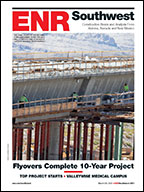 |
| Rell launches two-week test of vehicle emissions program |
After a notice from the Federal Highway Administration, Connecticut officials have taken steps to revive their suspended motor vehicle emissions testing program and, they hope, avert having up to $230 million in federal highway funds withheld. Connecticut Gov. M. Jodi Rell said on Sept. 9 the state would launch the following day a two-week limited field trial of the emissions testing system.
Rell's announcement came the day after FHWA's Connecticut Division Administrator, Bradley Keazer, wrote her a letter, stating that if Connecticut could not show that its transportation projects will not worsen area air pollution, some highway projects won't be able to move forward, said Keazer. If federal officials were to decide to impose funding sanctions, they could withhold as much as $230 million in highway funding, or 52% of the annual amount Connecticut receives, says Chris Cooper, a spokesman for the Connecticut Dept. of Transportation.
Among projects that could be affected, FHWA's Keazer said, are a new "Q Bridge" on Interstate 95 across New Haven Harbor and the Route 7 Brookfield Bypass in the western part of the state.
The state had been doing alpha, or acceptance, testing of new emissions test software. The field test, which started Sept. 10, initially covers 13 sites and is limited to vehicles on car dealers' lots and state vehicles, says Richard Cosgrove, chief administrative officer of the Connecticut Dept. of Motor Vehicles. After one week, 10 sites will be added. Moreover, Rell said negotiations are continuing to settle a lawsuit filed in state court by the emission test system contractor, Agbar Technologies Inc., Chicago, after Connecticut officials announced in April they were suspended the program.
Rell is "trying to find a resolution to the emission program so that we do not ever get anywhere near risking those funds," says Cooper.
Keazer noted that Connecticut's current Statewide Transportation Improvement Program, which contains a list of federally funded projects, expires on Sept. 30, and that it must file a new program showing that it is meeting the Clean Air Act requirements.
But after Rell's announcement, it doesn't appear that FHWA is about to lower the boom on the state. A FHWA spokesman in Washington says the agency's Administrator, Mary Peters, "shares Division Administrator Keazer's concern but also is confident that the state of Connecticut will meet the requirement of the Clean Air Act."
|
Connecticut's situation is another example of how states must demonstrate that federally funded transportation projects must conform with the Clean Air Act and not make local air quality worse. For Connecticut, having a viable emissions testing program is a key to providing data needed to prove its clean air conformity. FHWA's Keazer wrote, "We believe it will be difficult for [Connecticut's transportation improvement programs] to demonstrate consistency with the budget contained in the state's air quality implementation plan (SIP) without the vehicle emission testing program."
In April 2002, the state announced it would adopt a decentralized testing program that would expand the number of testing sites to about 300, including new-car dealerships and service stations, from about 25.
Testing began in October 2003, about a month later than the state anticipated. The state DMV brought in an outside firm to audit the system and when a draft of that report became public, the state legislature called for a halt of the testing. In April of this year, then-Gov.John Rowland and DMV Commissioner Gary J. DeFilippo announced that the test program would be suspended for 90 days. Agbar Technologies then sued the state.
DMV's Cosgrove says the state believes it will be able to get caught up so that by next year it will be able to test the necessary number of vehicles. But he adds, "The longer we're down, the more of a burden it becomes to play catch up."
(Photo courtesy of Office of Connecticut Governor M. Jodi Rell)


Post a comment to this article
Report Abusive Comment